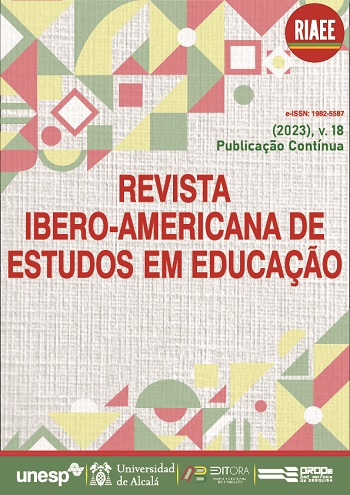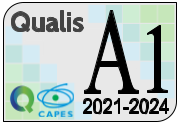Equívocos conceituais são difíceis de morrer
Compreensão da prevalência de crenças errôneas relacionadas aos diferentes estilos de aprendizagem entre professores
DOI:
https://doi.org/10.21723/riaee.v18i00.17992Palavras-chave:
Neuromitos, Ensino de ciências e biologia, Educação básicaResumo
Desde a sua criação, os Estilos de Aprendizagem (E.A) ganharam popularidade entre professores, pesquisadores e o público em geral. No entanto, esses estilos têm sido fortemente criticados por pesquisadores que afirmam que eles carecem de evidências que apoiem sua eficácia. Considerando o exposto, proponho neste trabalho analisar a compressão da conceituação bem como os meios de identificação dos Estilos de Aprendizagem de professores da educação básica de ciências e biologia no Distrito Federal. Para esse propósito, foi aplicado um questionário composto por perguntas abertas e fechadas. As respostas foram analisadas por meio da Análise Textual Discursiva. Após análise dos dados, foi possível observar que 60% dos professores afirmaram que fazem uso dos E.A no contexto de sala de aula. Os principais E.A observados foram conceituados dentro da estrutura visual-auditivo, bem como o estilo proposto por David Kolb e as Inteligências Múltiplas de Gardner.
Downloads
Referências
AN, D.; CARR, M. Learning styles theory fails to explain learning and achievement: Recommendations for alternative approaches. Personality and Individual Differences, v. 116, p. 410-416, 2017. Disponível em: https://www.sciencedirect.com/science/article/abs/pii/S0191886917303100. Acesso em: 17 out. 2022.
CLARK, R. E.; FELDON, D. F. Five common but questionable principles of multimedia learning. In: MAYER, R. (ed.). The Cambridge handbook of multimedia learning. Cambridge: Cambridge University Press, 2005.
COFFIELD, F. et al. Learning styles and pedagogy in post-16 learning: A systematic and critical review. Londres: Learning and Skills Research Centre, 2004.
COOK, D. et al. Validity of index of learning styles scores: multitrait− multimethod comparison with three cognitive/learning style instruments. Medical education, v. 40, n. 9, p. 900-907, 2006. Disponível em: https://pubmed.ncbi.nlm.nih.gov/16925641/. Acesso em: 12 ago. 2022.
COOK, D. et al. Instructional methods and cognitive and learning styles in web‐based learning: report of two randomised trials. Medical education, v. 41, n. 9, p. 897-905, 2007. Disponível em: https://pubmed.ncbi.nlm.nih.gov/17727530/. Acesso em: 17 jun. 2022.
COOK, D. et al. Lack of interaction between sensing–intuitive learning styles and problem-first versus information-first instruction: A randomized crossover trial. Advances in Health Sciences Education, v. 14, n. 1, p. 79-90, 2009. Disponível em: https://pubmed.ncbi.nlm.nih.gov/18038188/. Acesso em: 17 out. 2022.
DANDY, K. L.; BENDERSKY, K. Student and faculty beliefs about learning in higher education: implications for teaching. International Journal of Teaching and Learning in Higher Education, v. 26, n. 3, p. 358-380, 2014. Disponível em: https://files.eric.ed.gov/fulltext/EJ1060843.pdf. Acesso em: 17 out. 2022.
DEKKER, S. et al. Neuromyths in education: Prevalence and predictors of misconceptions among teachers. Frontiers in psychology, v. 3, p. 429, 2012. Disponível em: https://www.frontiersin.org/articles/10.3389/fpsyg.2012.00429/full. Acesso em: 17 out. 2022.
DELIGIANNIDI, K.; HOWARD-JONES, P. A. The neuroscience literacy of teachers in Greece. Procedia-Social and Behavioral Sciences, v. 174, p. 3909-3915, 2015. Disponível em: https://www.sciencedirect.com/science/article/pii/S1877042815011921. Acesso em: 17 out. 2022.
DÜNDAR, S.; GÜNDÜZ, N. Misconceptions regarding the brain: The neuromyths of preservice teachers. Mind, Brain, and Education, v. 10, n. 4, p. 212-232, 2016. Disponível em: https://onlinelibrary.wiley.com/doi/abs/10.1111/mbe.12119. Acesso em: 17 out. 2022.
FLEMING, N.; BAUME, D. Learning Styles Again: VARKing up the right tree! Educational developments, v. 7, n. 4, p. 4-7, 2006. Disponível em: https://www.vark-learn.com/wp-content/uploads/2014/08/Educational-Developments.pdf. Acesso em: 17 out. 2022.
FRANKLIN, S. VAKing out learning styles—why the notion of ‘learning styles’ is unhelpful to teachers. Education 3–13, v. 34, n. 1, p. 81-87, 2006. Disponível em: https://www.tandfonline.com/doi/abs/10.1080/03004270500507644. Acesso em: 17 out. 2022.
GARDNER, H. Frames of mind. New York: Basic Books, 1983.
GARDNER, H. Estruturas da mente: A teoria das inteligências múltiplas. Porto Alegre, RS: Artmed, 1995.
GARDNER, H. “Neuromyths”: A critical consideration. Mind, Brain, and Education, v. 14, n. 1, p. 2-4, 2020. Disponível em: https://onlinelibrary.wiley.com/doi/abs/10.1111/mbe.12229. Acesso em: 12 jun. 2022.
GEAKE, J. Neuromythologies in education. Educational research, v. 50, n. 2, p. 123-133, 2008. Disponível em: https://www.tandfonline.com/doi/abs/10.1080/00131880802082518. Acesso em: 15 nov. 2022.
GLEICHGERRCHT, E. et al. Educational neuromyths among teachers in latin america. Mind, Brain and Education, v. 9, n. 3, p. 170- 178, 2015. Disponível em: https://onlinelibrary.wiley.com/doi/abs/10.1111/mbe.12086. Acesso em: 15 dez. 2022.
GROSPIETSCH, F.; MAYER, J. Misconceptions about neuroscience–prevalence and persistence of neuromyths in education. Neuroforum, v. 26, n. 2, p. 63-71, 2020. Disponível em: https://www.degruyter.com/document/doi/10.1515/nf-2020-0006/html. Acesso em: 12 nov. 2022.
GUDNASON, J. Learning Styles in Education: A Critique. BU Journal of Graduate Studies in Education, v. 9, n. 2, p. 19-23, 2017. Disponível em: https://eric.ed.gov/?id=EJ1230420. Acesso em: 15 nov. 2022.
HERCULANO-HOULZEL, S. Do you know your brain? A survey on public neuroscience literacy at the closing of the decade of the brain. The Neuroscientist, USA, v. 8, n. 2, p. 98-110, 2002. Disponível em: https://pubmed.ncbi.nlm.nih.gov/11954564/. Acesso em: 20 jun. 2022.
KIRSCHNER, P. Stop propagating the learning styles myth. Computers & Education, v. 106, p. 166-171, 2017. Disponível em: https://www.sciencedirect.com/science/article/abs/pii/S0360131516302482. Acesso em: 10 nov. 2022.
KOLB, D. Experiential learning: Experience as the source of learning and development. Nova Jersey, EUA: FT press, 1984
KOLB, D. Learning style inventory. Boston, MA: McBer and Company, 1985.
KUNTER, M. et al. Professional competence of teachers: effects on instructional quality and student development. Journal of educational psychology, v. 105, n. 3, p. 805-820, 2013. Disponível em: https://psycnet.apa.org/record/2013-14501-001. Acesso em: 12 ago. 2022.
MCCUTCHEON, L. E. et al. A cross-national comparison of students' misconceptions about psychology. Psychological Reports, v. 72, n. 1, p. 243-247, 1993. Disponível em: https://psycnet.apa.org/record/1993-31353-001. Acesso em: 10 ago. 2022.
MERRILL, D. Instructional strategies and learning styles: Which takes precedence. Trends and issues in instructional technology, p. 99-106, 2002.
MORAES, R.; GALIAZZI, M. C. Análise textual discursiva: processo reconstrutivo de múltiplas faces. Ciência & Educação, Bauru, v. 12, n. 1, p. 117-128, 2006. Disponível em: https://www.scielo.br/j/ciedu/a/wvLhSxkz3JRgv3mcXHBWSXB/abstract/?lang=pt. Acesso em: 10 out. 2022.
MOREHEAD, K. et al. Instructor and student knowledge of study strategies. Memory, v. 24, n. 2, p. 257-271, 2016. Disponível em: https://pubmed.ncbi.nlm.nih.gov/25625188/. Acesso em: 10 out. 2022.
NEWTON, P. M.; MIAH, M. Evidence-based higher education–is the learning styles ‘myth’important? Frontiers in psychology, v. 8, 444, p. 1-9, 2017. Disponível em: https://www.frontiersin.org/articles/10.3389/fpsyg.2017.00444/full. Acesso em: 10 out. 2022.
NEWTON, P. The learning styles myth is thriving in higher education. Frontiers in psychology, v. 6, 1908, p. 1-5, 2015. Disponível em: https://www.frontiersin.org/articles/10.3389/fpsyg.2015.01908/full. Acesso em: 10 out. 2022.
OLSEN, A. et al. Myth Busted or Zombie Concept? A Systematic Review of Articles Referencing “Learning Styles” from 2009 to 2019. In: ROBINSON, D. H.; YAN, V. X.; KIM, J. A. (ed.). Learning Styles, Classroom Instruction, and Student Achievement. Berlim: Springer, 2022.
PAPADATOU-PASTOU, M. et al. Brain knowledge and the prevalence of neuromyths among prospective teachers in Greece. Frontiers in psychology, v. 8, 804, 2017. Disponível em: https://www.frontiersin.org/articles/10.3389/fpsyg.2017.00804/full. Acesso em: 12 out. 2022.
PAPADATOU-PASTOU, M. et al. The learning styles neuromyth: when the same term means different things to different teachers. European Journal of Psychology of Education, v. 36, n. 2, p. 511-531, 2021. Disponível em: https://link.springer.com/article/10.1007/s10212-020-00485-2. Acesso em: 12 out. 2022.
PASHLER, H. et al. Learning styles: Concepts and evidence. Psychological science in the public interest, v. 9, n. 3, p. 105-119, 2009. Disponível em: https://journals.sagepub.com/doi/full/10.1111/j.1539-6053.2009.01038.x. Acesso em: 10 nov. 2022.
POMERANCE, L. et al. Learning about Learning: What Every New Teacher Needs to Know. National Council on Teacher Quality, 2016.
RATO, J. R. et al. Achieving a successful relationship between neuroscience and education: The views of Portuguese teachers. Procedia-Social and Behavioral Sciences, v. 29, p. 879-884, 2011. Disponível em: https://www.sciencedirect.com/science/article/pii/S1877042811027789. Acesso em: 12 out. 2022.
RATO, J. R. et al. Neuromyths in education: what is fact and what is fiction for Portuguese teachers? Educational Research, Portugal, v. 55, n. 4, p. 441-453, 2013. Disponível em: https://www.tandfonline.com/doi/abs/10.1080/00131881.2013.844947. Acesso em: 12 jun. 2022.
RIENER, C.; WILLINGHAM, D. The myth of learning styles. Change: The magazine of higher learning, v. 42, n. 5, p. 32-35, 2010. Disponível em: https://www.tandfonline.com/doi/abs/10.1080/00091383.2010.503139. Acesso em: 18 ago. 2022.
ROHRER, D.; PASHLER, H. Learning Styles: Where's the Evidence? Online Submission, v. 46, n. 7, p. 634-635, 2012. Disponível em: https://pubmed.ncbi.nlm.nih.gov/22691144/. Acesso em: 11 out. 2022.
SCOTT, C. The enduring appeal of ‘learning styles’. Australian Journal of Education, v. 54, n. 1, p. 5-17, 2010. Disponível em: https://journals.sagepub.com/doi/10.1177/000494411005400102. Acesso em: 20 nov. 2022.
TARDIF, E. et al. Neuromyths among teachers and student teachers. Mind, brain, and Education, v. 9, n. 1, p. 50-59, 2015. Disponível em: https://onlinelibrary.wiley.com/doi/abs/10.1111/mbe.12070. Acesso em: 20 nov. 2022.
WILLINGHAM, D. et al. The scientific status of learning styles theories. Teaching of Psychology, v. 42, n. 3, p. 266-271, 2015. Disponível em: https://journals.sagepub.com/doi/abs/10.1177/0098628315589505. Acesso em: 20 out. 2022.
WININGER, S. et al. Prevalence of learning styles in educational psychology and introduction to education textbooks: A content analysis. Psychology Learning & Teaching, v. 18, n. 3, p. 221-243, 2019. Disponível em: https://journals.sagepub.com/doi/full/10.1177/1475725719830301. Acesso em: 20 dez. 2022.
Downloads
Publicado
Como Citar
Edição
Seção
Licença
Copyright (c) 2023 João Paulo Cunha de Menezes

Este trabalho está licenciado sob uma licença Creative Commons Attribution-NonCommercial-ShareAlike 4.0 International License.
Manuscritos aceitos e publicados são de propriedade dos autores com gestão da Ibero-American Journal of Studies in Education. É proibida a submissão total ou parcial do manuscrito a qualquer outro periódico. A responsabilidade pelo conteúdo dos artigos é exclusiva dos autores. A tradução para outro idioma é proibida sem a permissão por escrito do Editor ouvido pelo Comitê Editorial Científico.








